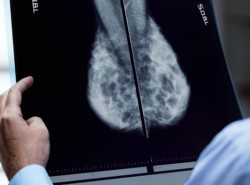
Identifying factors that make some cancers aggressive
Published: 10/9/19 1:48 AM
Antonella Papa
Breast cancer is a complex disease that changes over time by acquiring several genetic defects, or mutations. There are multiple mutations that need to occur in order for breast cancer to develop, grow quickly or spread around the body.
This study aims to identify the factors that make early benign breast tumours become the fast-growing malignant disease known as cancer. Additionally the project supports the idea that long term remission and breast cancer cure can be achieved by adopting a personalised medicine, where treatments are directed to the specific core components of a cancer.
We know breast cancer is not one disease, but has many different sub-types, and that breast cancer learns how to escape treatments by changing over time. Because of this, it has become clear that no single treatment will ever be able to cure all types of breast cancer.
However, with a deeper understanding of the biological markers (genes) that make up the core components of each type of cancer, personalised therapies can become more refined and effective.
Dr Antonella Papa will investigate two specific genes that frequently mutate in ER+ and HER2+ breast cancer subtypes and result in the proteins PI3K and PTEN being made.
In normal tissue, PTEN, a key tumour suppressor, controls the activity of PI3K which keeps pro-growth factors in check. In cancer, the two proteins behave quite differently; PI3K is super-active and PTEN becomes inactive or is lost. The lack of PTEN activity is commonly associated with poor prognosis in many tumour types and with patients developing resistance to targeted therapies (i.e. HER2+ breast cancers).
The study will investigate how the presence of these mutated proteins affect breast tissue biology in mice to identify the pro-growth factors that accumulate over time and make the tumour bigger and more aggressive.
By identifying these new factors, Dr Papa and her team will be able to address why current treatments are only partially effective in treating advanced breast cancer and will test whether targeting these newly identified pro-growth factors can be used to develop more effective therapies for breast cancer linked to PI3K and PTEN mutations.
The findings of this study have the potential to influence treatment decisions for the large number of patients with advanced breast cancer.
